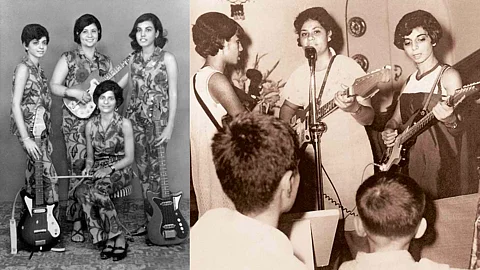
- HOMEGROWN WORLD
- #HGCREATORS
- #HGEXPLORE
- #HGVOICES
- #HGSHOP
- CAREERS
- ABOUT US
- CONTACT US

Farida Vakil just wanted to play music with her friends. But in doing so, she ended up forming India’s first all-girl rock band. This was the late 1960s. A group of teenagers at St. Joseph’s Convent in Bandra, passing time during lunch break, started harmonising just for fun. One of them, Merlyn, drummed on her desk. Another, Jenny, could handle a bassline. Zarina strummed rhythm guitar. And Farida had a knack for lead. The sound clicked and the chemistry was instant. So they kept going.
They called themselves 'The Ladybirds'. They were four girls with instruments, and they wanted to be heard.
Farida’s father believed in them. He managed the band himself, finding venues, locking in shows, and standing in the wings. It was he who bought Farida her first electric guitar when she was sixteen. Music was always in Farida’s life. Her older sister worked with an airline and would bring back records from abroad: jazz, Latin American tunes, Spanish guitar, and flamenco. They were fuel. Listening became learning and learning led to playing.
At the time, Western music in Bombay was dominated by men. Big male bands like 'The Savages' and 'The Mystiks' ruled the stage. Female singers existed — Usha Iyer was already making her mark — but an all-girl band was unheard of. You didn’t see women holding electric guitars on stage. You didn’t see them jamming in beat competitions.
That's what made The Ladybirds different. And people noticed. In 1971, Junior Statesman published a full-page feature on Farida, calling her a “pop Jhansi Rani.” It was a bold comparison, but not an empty one. Their gigs took them to parties, social functions, and clubs. They played where they could. And for a while, they thrived. But life took its course. One bandmate got married and moved away. Another settled in Goa. Bit by bit, the group faded.
Still, Farida wasn’t done. She joined The Riot Squad, a five-member beat band preparing for the Simla Beat competition. They needed a lead guitarist. With only fifteen days to rehearse, they pulled it off. The band won the 1971 contest and landed a record deal with Polydor. She stayed with them until 1973, leaving the group when she got married.
It’s easy to flatten stories like these into footnotes. To summarise them in a line or two. But that would miss the point. The Ladybirds were a disruption. At a time when Western music wasn’t really taken seriously across the Indian musical lanscape, and especially not if you were a girl, they carved out space for themselves anyway with no manager, no fancy production, and no social media; just instruments, curiosity, and an appetite for sound.
Today, India’s music history is filled with names, styles, and stories but the Ladybirds paved the way. They mattered and they helped build the scene that exists today. Farida Vakil is remembered as the country’s first female lead guitarist. She doesn’t make a fuss about it. But her presence shifted the frame. She held her guitar like it belonged to her because she made the instrument her own.
And that image, of a young girl on stage, plugged in, not waiting to be asked, is what will always stand the test of time.
If you enjoyed reading this, here's more from Homegrown:
Gig Series 'Not Dead Yet' Aims To Spotlight India’s Ever-Expanding Musical Landscape
Billed To Destroy: Homegrown Hardcore Is Raging Against The Banality Of The Status Quo
Rainbow Disco Club Is Making Its India Debut In Goa With 'Don’t Forget To Go Home'
